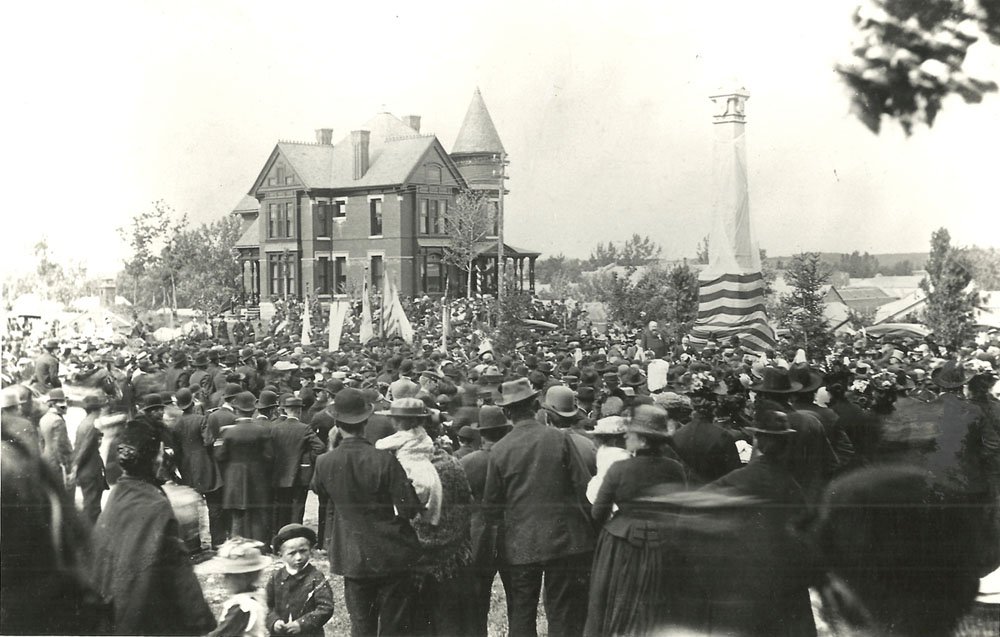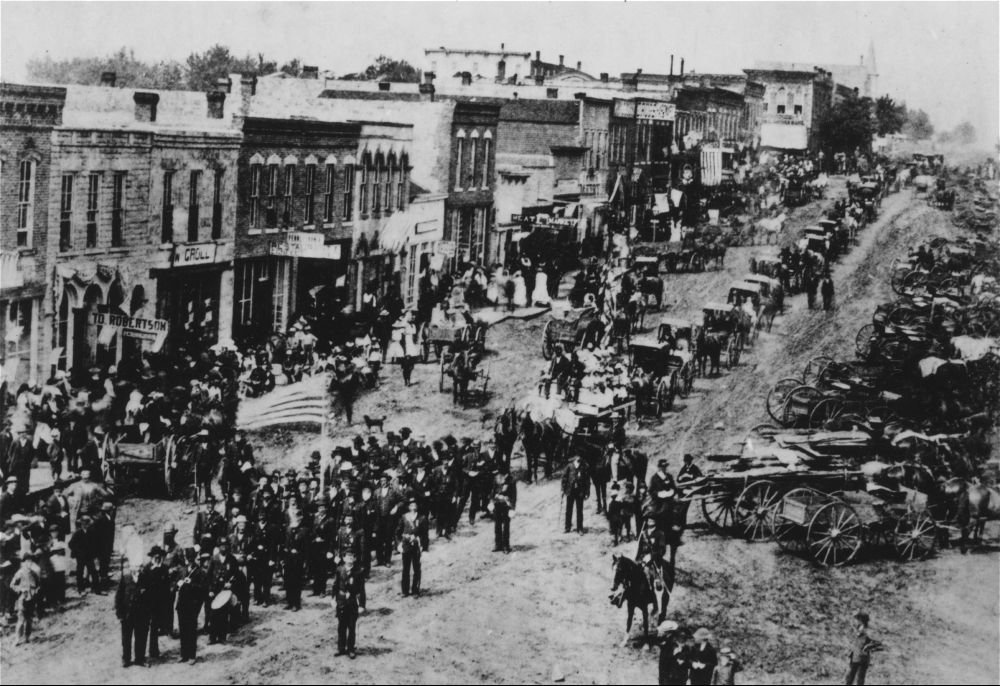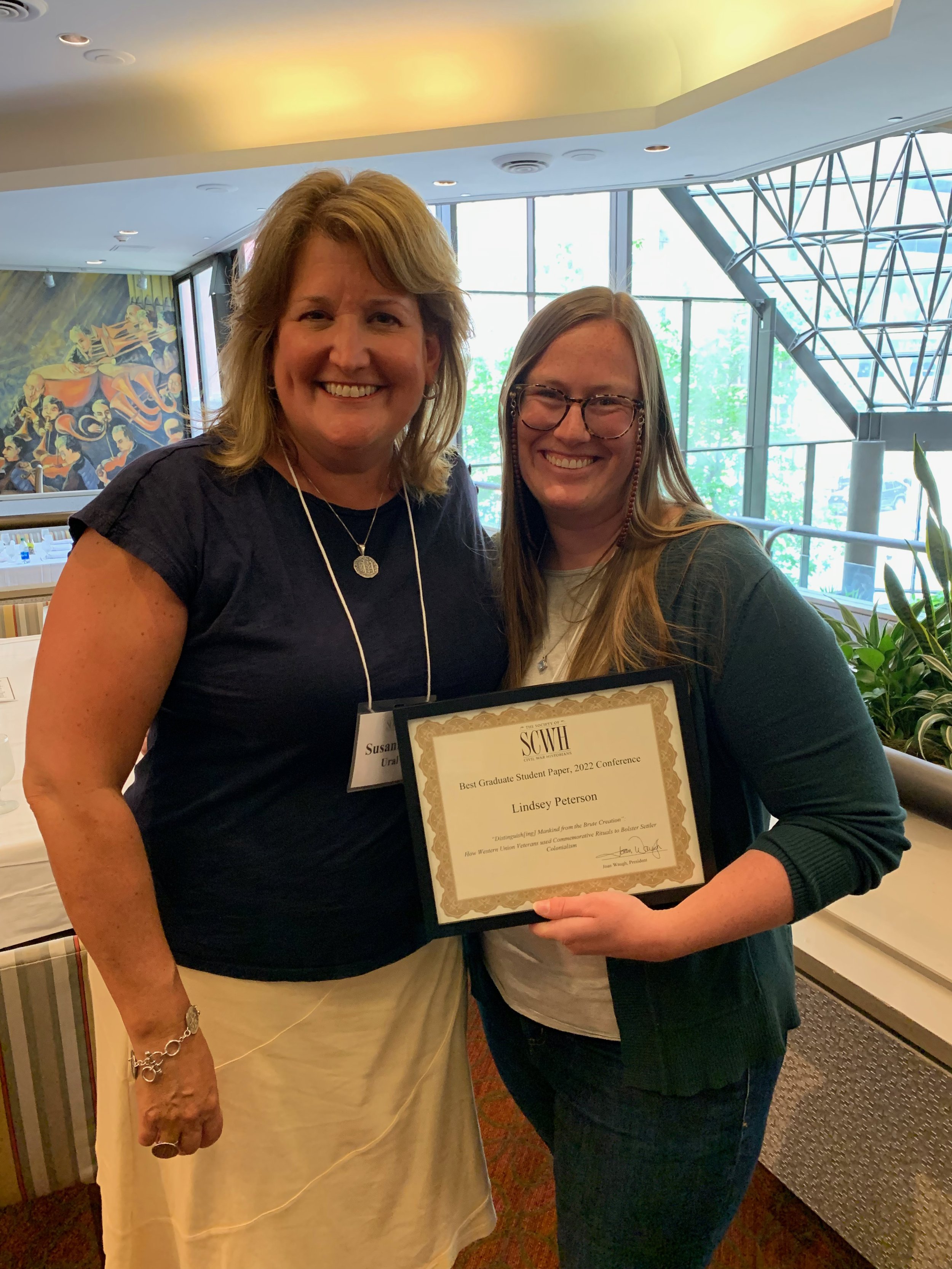
Research
Current Project
The Expansionist Cause: Union Civil War Commemorations as Tools of Western Colonization
Using analytical methods of gender, race, and historical memory studies, my manuscript project connects several important strands of historiography that have focused on the lives of Civil War veterans, the memory of the American Civil War, and process of settler colonialism through the lens of the Trans-Mississippi West. These approaches reveal that the Civil War meant something distinctly different to veterans and their families in the West than those in the East. In their celebrations of the Civil War, western Union veterans and their families celebrated white westward expansion and supremacy to construct a narrative of the war that bolstered Anglo-American hegemony in the West. These distinctions reveal a larger significance of the war to the Civil War generation, and underscore how these veterans and their families connected the war to the larger national narrative. Together, Union veterans and their families saw their contributions to the Union and abolition as making an equally large contribution to the nation as a whole.
Publications
“’The Defenders, Protectors and Builders of Our State’: The Colonial Legacy of Union Civil War Commemorations in Kansas, 1870s–1910s”
Published in Journal of War & Society 42, no. 3 (August 2023): 233–250
This article examines how white Kansan Union veterans and their families commemorated the American Civil War throughout the late-nineteenth and early-twentieth centuries. Kansans’ post-war narratives, including a monument erected to Gen. James B. McPherson in 1917, constructed a legacy of the war that asserted the Union war effort preserved the trans-Mississippi West for free-labour and celebrated veteran-pioneers for fulfilling the promise of a free-labour American empire by migrating to Kansas post-war. Distinct from their eastern counterparts, Kansan Union veterans and their families wielded collective memories of the Civil War as a tool of colonisation in the American West.
“We are now at Gettysburg”: Gender and Place in the Iowa Woman’s Relief Corps’ Monument to Jennie Wade”
Published in Civil War History 68, no. 4 (December 2022): 373–396
While visiting Gettysburg National Military Park in 1899, a small group of the Iowa Woman’s Relief Corps (WRC) broke away from its delegation to visit the home and gravesite of Mary Virginia “Jennie” Wade. Wade was the only recorded civilian casualty during the Battle of Gettysburg and sister of prominent Iowa WRC leader, Georgianna “Georgia” Wade McClellan. Despite several attempts by Pennsylvanians living outside of Gettysburg, little had been done to memorialize Wade in the thirty-six years since her death. The Gettysburg community renounced Wade because some believed she had failed to obey rigid nineteenth-century gender roles, therefore marking herself as unworthy of remembrance. Capitalizing on Iowa’s association with McClellan and McClellan’s connection to Wade and therefore Gettysburg, however, the Iowa WRC enthusiastically commemorated Wade to bring recognition to Iowa women’s work for the Union cause and its remembrance. Iowa WRC women’s efforts to commemorate Wade reveal that place and region impacted how northerners decided who was deemed worthy of commemoration in the Civil War North.
“’Iowa Excelled Them All’: Iowa Local Ladies’ Aid Societies Relief on the Civil War Frontier, 1861–1865”
Published in Middle West Review 3, no. 1 (Fall 2016): 49–70
Throughout the American Civil War, Iowan women performed relief work for soldiers and their families on the home front in Local Ladies’ Aid Societies. Iowan women believed their wartime benevolent work augmented their relationship with the national government and served as evidence of their greater patriotism and loyalty to the cause. As frontier residents Iowans shared dual loyalties to supporting the Union and developing their state. Although their efforts were often similar to eastern women’s, women in aid societies in Iowa viewed the added burden of frontier life as a testament to their loyalty and patriotism.
Presentations
“’A Western March of Empire’: South Dakotans Commemorate the American Civil War” at the University of South Dakota’s History Graduate Program Centennial Conference & Reunion in Vermillion, South Dakota (September 2022)
“’Distinguish[ing] Mankind from the Brute Creation’: How Western Union Veterans used Commemorative Rituals to Bolster Settler Colonialism” recipient of the Outstanding Paper by a Graduate Student Award at the Society of Civil War Historians Annual Meeting in Philadelphia, Pennsylvania (June 2022)
“’We are now at Gettysburg’: Gender and Place in the Iowa Woman’s Relief Corps’ Monument to Jennie Wade” at the Society for Military History Northern Great Plains Region Conference in Online (March 2022)
“Soldier and Settler: Race and Gender in Western Civil War Commemorations” at the Western Historical Association Annual Meeting in Online (October 2020)
“’Between Enlightenment and Barbarism’: The Dedication of the James B. McPherson Monument in McPherson, Kansas” at the Society for Civil War Historians Annual Meeting in Pittsburg, Pennsylvania (June 2018)
Fellowships & Awards








